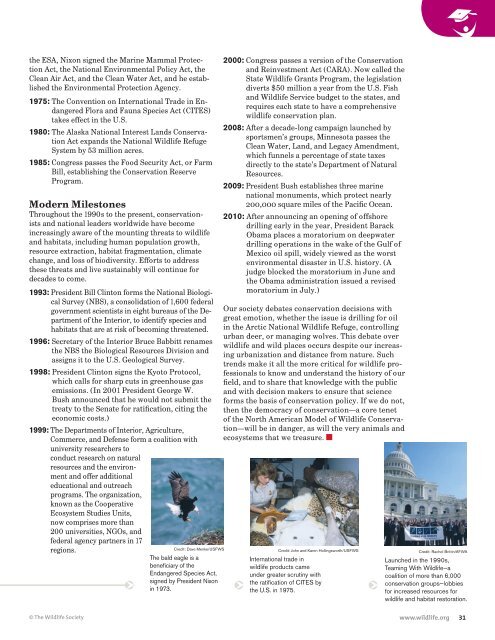A Conservation Timeline - Oklahoma Department of Wildlife ...
A Conservation Timeline - Oklahoma Department of Wildlife ...
A Conservation Timeline - Oklahoma Department of Wildlife ...
You also want an ePaper? Increase the reach of your titles
YUMPU automatically turns print PDFs into web optimized ePapers that Google loves.
the ESA, Nixon signed the Marine Mammal Protection<br />
Act, the National Environmental Policy Act, the<br />
Clean Air Act, and the Clean Water Act, and he established<br />
the Environmental Protection Agency.<br />
1975: The Convention on International Trade in Endangered<br />
Flora and Fauna Species Act (CITES)<br />
takes effect in the U.S.<br />
1980: The Alaska National Interest Lands <strong>Conservation</strong><br />
Act expands the National <strong>Wildlife</strong> Refuge<br />
System by 53 million acres.<br />
1985: Congress passes the Food Security Act, or Farm<br />
Bill, establishing the <strong>Conservation</strong> Reserve<br />
Program.<br />
Modern Milestones<br />
Throughout the 1990s to the present, conservationists<br />
and national leaders worldwide have become<br />
increasingly aware <strong>of</strong> the mounting threats to wildlife<br />
and habitats, including human population growth,<br />
resource extraction, habitat fragmentation, climate<br />
change, and loss <strong>of</strong> biodiversity. Efforts to address<br />
these threats and live sustainably will continue for<br />
decades to come.<br />
1993: President Bill Clinton forms the National Biological<br />
Survey (NBS), a consolidation <strong>of</strong> 1,600 federal<br />
government scientists in eight bureaus <strong>of</strong> the <strong>Department</strong><br />
<strong>of</strong> the Interior, to identify species and<br />
habitats that are at risk <strong>of</strong> becoming threatened.<br />
1996: Secretary <strong>of</strong> the Interior Bruce Babbitt renames<br />
the NBS the Biological Resources Division and<br />
assigns it to the U.S. Geological Survey.<br />
1998: President Clinton signs the Kyoto Protocol,<br />
which calls for sharp cuts in greenhouse gas<br />
emissions. (In 2001 President George W.<br />
Bush announced that he would not submit the<br />
treaty to the Senate for ratification, citing the<br />
economic costs.)<br />
1999: The <strong>Department</strong>s <strong>of</strong> Interior, Agriculture,<br />
Commerce, and Defense form a coalition with<br />
university researchers to<br />
conduct research on natural<br />
resources and the environment<br />
and <strong>of</strong>fer additional<br />
educational and outreach<br />
programs. The organization,<br />
known as the Cooperative<br />
Ecosystem Studies Units,<br />
now comprises more than<br />
200 universities, NGOs, and<br />
federal agency partners in 17<br />
regions.<br />
© The <strong>Wildlife</strong> Society<br />
Credit: Dave Menke/USfWS<br />
the bald eagle is a<br />
beneficiary <strong>of</strong> the<br />
endangered Species Act,<br />
signed by President Nixon<br />
in 1973.<br />
2000: Congress passes a version <strong>of</strong> the <strong>Conservation</strong><br />
and Reinvestment Act (CARA). Now called the<br />
State <strong>Wildlife</strong> Grants Program, the legislation<br />
diverts $50 million a year from the U.S. Fish<br />
and <strong>Wildlife</strong> Service budget to the states, and<br />
requires each state to have a comprehensive<br />
wildlife conservation plan.<br />
2008: After a decade-long campaign launched by<br />
sportsmen’s groups, Minnesota passes the<br />
Clean Water, Land, and Legacy Amendment,<br />
which funnels a percentage <strong>of</strong> state taxes<br />
directly to the state’s <strong>Department</strong> <strong>of</strong> Natural<br />
Resources.<br />
2009: President Bush establishes three marine<br />
national monuments, which protect nearly<br />
200,000 square miles <strong>of</strong> the Pacific Ocean.<br />
2010: After announcing an opening <strong>of</strong> <strong>of</strong>fshore<br />
drilling early in the year, President Barack<br />
Obama places a moratorium on deepwater<br />
drilling operations in the wake <strong>of</strong> the Gulf <strong>of</strong><br />
Mexico oil spill, widely viewed as the worst<br />
environmental disaster in U.S. history. (A<br />
judge blocked the moratorium in June and<br />
the Obama administration issued a revised<br />
moratorium in July.)<br />
Our society debates conservation decisions with<br />
great emotion, whether the issue is drilling for oil<br />
in the Arctic National <strong>Wildlife</strong> Refuge, controlling<br />
urban deer, or managing wolves. This debate over<br />
wildlife and wild places occurs despite our increasing<br />
urbanization and distance from nature. Such<br />
trends make it all the more critical for wildlife pr<strong>of</strong>essionals<br />
to know and understand the history <strong>of</strong> our<br />
field, and to share that knowledge with the public<br />
and with decision makers to ensure that science<br />
forms the basis <strong>of</strong> conservation policy. If we do not,<br />
then the democracy <strong>of</strong> conservation—a core tenet<br />
<strong>of</strong> the North American Model <strong>of</strong> <strong>Wildlife</strong> <strong>Conservation</strong>—will<br />
be in danger, as will the very animals and<br />
ecosystems that we treasure.<br />
Credit: John and Karen hollingsworth/USfWS<br />
international trade in<br />
wildlife products came<br />
under greater scrutiny with<br />
the ratification <strong>of</strong> CiteS by<br />
the U.S. in 1975.<br />
Credit: Rachel Brittin/AfWA<br />
launched in the 1990s,<br />
teaming With <strong>Wildlife</strong>—a<br />
coalition <strong>of</strong> more than 6,000<br />
conservation groups—lobbies<br />
for increased resources for<br />
wildlife and habitat restoration.<br />
www.wildlife.org<br />
31







